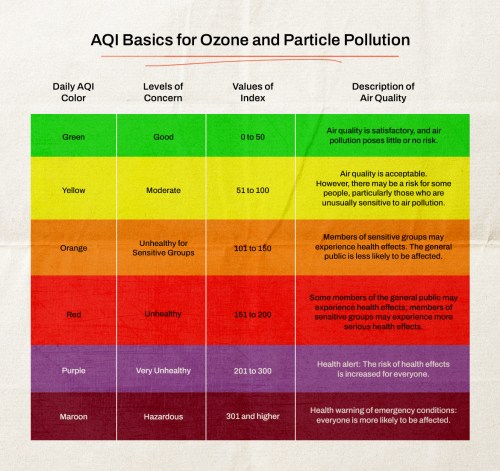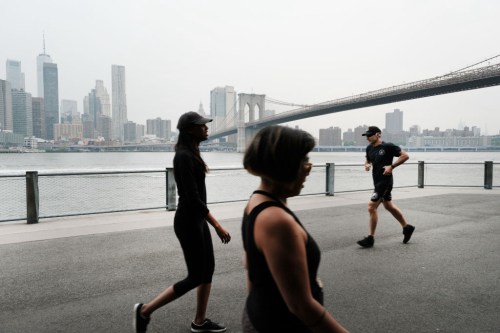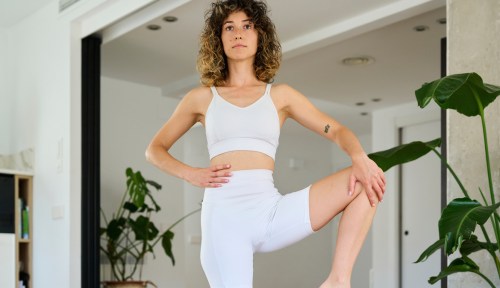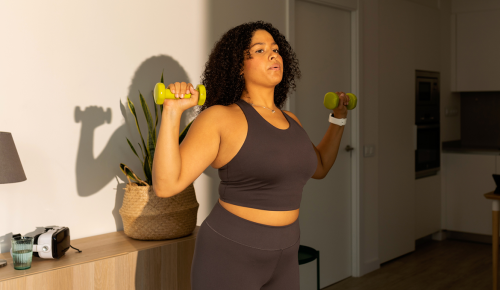Our editors independently select these products. Making a purchase through our links may earn Well+Good a commission
Once again, folks in the west are waking up to the all-too-familiar hazy skies of wildfire season. Cities in Oregon and northern California are feeling the brunt of two large blazes, and other states are getting smoke from fires in Canada, too. As air quality alerts continue to become a normal—albeit dystopian—part of life, it can feel easier to shove them aside and try to keep your day-to-day unchanged. However, experts say there is one part of your routine you should modify when air quality is bad: your exercise routine.
Experts in This Article
pulmonologist and associate professor at the Burnett School of Medicine at Texas Christian University
And while we can tell when the sky is hazy, the true quality of the air is not always apparent just by sight. A dive into air quality apps will give you the precise measurement of ground ozone and inhalable pollutants in your area.
Take the government-run site AirNow. Where I live in Seattle, Washington, the Air Quality Index (AQI) is “Good,” and I’m given a prompt to “enjoy your outdoor activities.” But 600 miles southeast in Boise, Idaho, the AQI is “Very Unhealthy,” and sensitive groups are advised to avoid outdoor activity, while everyone else should avoid “strenuous” outdoor activity.
The distinction, though slight, is important. Physical activity is very good for your health, but the wrong conditions can change that. And certain groups have an elevated risk.
“Exercise itself is protective,” says Steven Davis, MD, a pulmonologist and associate professor at the Burnett School of Medicine at Texas Christian University. “It’s this balance between, is it better to breathe in a bunch of crappy air, but get the benefits of exercise? Which is worse?”
Read on to learn more about what you can do about your outdoor activities.
How air quality impacts health
Air quality is affected by a number of things both natural (like decomposing organic matter and volcanic eruptions) and manmade (like vehicle emissions and power generation), according to the National Institutes of Health. AQI generally looks at three types of pollutants: ground ozone, and coarse and fine particles.

“The pollutants that you breathe in tend to cause a lot of reactions, particularly with oxygen in the body, and through those reactions create harmful byproducts,” says Dr. Davis. Those byproducts are called free radicals, and a buildup of free radicals is damaging to cells.
Free radical damage has been linked to a number of chronic health conditions1 such as cardiovascular disease, inflammation, cataracts, and cancer. In the short term, you may feel fatigued during periods of high pollution, have asthma flare ups, or experience reduced lung function. Studies show2 that emergency department visits and hospital admissions increase when outdoor air pollution is high.
“As we’re learning more about what pollution can do, there seems to be a pretty clear link with generalized inflammation in the body.”—Steven Davis, MD
“As we’re learning more and more about what pollution can do, there seems to be a pretty clear link with generalized inflammation in the body,” says Dr. Davis. “So that then impacts just about every organ system, every process in the body.” That includes an increased risk for diabetes and neurological disorders, he notes, on top of the increased risk for heart attack and stroke.
Air quality and exercise
On days when the AQI reaches an unhealthy level, you may hear your local news station or favorite weather app declare it an “air quality action day.” These are days when you’ll want to think about limiting “strenuous” outdoor activity.
But what counts as strenuous activity?
If you’re out running, hiking, or cycling, for example, you’re going to be inhaling even more pollutants as you breathe more frequently and naturally take bigger breaths. Studies have shown that exercising outdoors in poor air quality3 most often resulted in lung function impairment and increased an otherwise healthy individual’s risk of cardiovascular disease4.
Lighter activities (think walking, stand up paddle boarding, kayaking) are generally okay, but the public health guidance is to take more breaks if you can. If you feel short of breath or start coughing, it’s time to come inside.
On rare days marked as “hazardous,” it’s best to avoid any outdoor activity.
What to know if…
Exercising outdoors on action days on an intermittent basis is probably okay for adults and young adults who are otherwise healthy, says Dr. Davis. (See below for precautions you can take.) But some groups of people should do everything they can to avoid activities that rely heavily on your cardiovascular system when air quality is poor.
There’s no data on how long is safe to huff and puff in bad air, so best to just skip that run altogether if you’re in one of the following groups.
…You’re Older
Older adults are advised to avoid outdoor activity on air quality action days for a number of reasons5. For one, as you age, you’re more susceptible to toxins in the air due to a general decline in physiological functions. Older adults are also more likely to have a chronic condition that also puts them at risk for the negative impacts of pollution. And the accumulation of pollution-related health conditions can make you more susceptible, too.
…You Have a Pre-Existing Condition
Like older adults, people with pre-existing conditions like lung disease, asthma, long COVID, and chronic obstructive pulmonary disease (COPD) should avoid strenuous activity outdoors on days when pollution is high.
If you want to give light exercise outdoors a try, say a jog or a yoga flow at the park, make sure you’re paying attention to your body. Keep any medications you may need nearby. Stop if breathing becomes harder or you start coughing.
…You’re Pregnant
Dr. Davis says pregnancy is a bit more complicated, and one that might warrant a conversation with your OBGYN. If you’ve experienced any complications during your pregnancy, such as gestational diabetes or high blood pressure, then you’d fall into the high-risk groups and should definitely avoid strenuous exercise on air quality action days.
If you’re otherwise healthy, it’s less cut and dry, but still a time to exercise caution.
“My concern would be because you are breathing in more during periods of exercise, everything mom is breathing in is likely going to be transmitted across the placenta,” says Dr. Davis. Recent studies have shown links6 between air pollution and adverse pregnancy outcomes.
Precautions you can (and should!) take
The best thing you can do when air quality is bad but you still want to workout is opt for a good old-fashioned gym workout. But not everyone has access to a gym space. And sometimes you just can’t turn your life upside down when air quality is poor—it’s an environmental impact that we have basically no control over.
Here are just a few things you can do to make your outdoor exertion just a touch safer:
Adjust the time of day you’re going out
Pollution in cities can be at its worst during rush hour and the hottest hours of the day. If you can get out in the early morning, you lower your exposure risk.
Find green spaces to exert yourself
With the exception of actively burning wildfires, natural spaces have less pollution than industrialized areas. The further you can get away from a busy road, the more your lungs will thank you.
Work out in a mask
Yes, it sounds miserable. Dr. Davis recommends this as a last resort option if you really can’t avoid the activity. N95 masks can offer you a certain level of protection, but don’t expect them to filter everything, like ozone and gasses.
Plan your week around the AQI
AirNow offers an air quality forecast at least three days out. If you’re following a training plan or have a typical exercise routine, consider shuffling around your outdoor days based on the AQI forecast.
“While the U.S. may actually have some better standards and better protections than other developing parts of the world, it may be practically impossible to avoid exercise or strenuous activity in polluted air,” says Dr. Davis.
Instead, treat high pollutant and hazy days like you would any other inclement weather event like a blizzard or storm: Plan ahead; stay indoors if you can; and use common sense when it comes to exercising in extreme conditions.
Lobo, V et al. “Free radicals, antioxidants and functional foods: Impact on human health.” Pharmacognosy reviews vol. 4,8 (2010): 118-26. doi:10.4103/0973-7847.70902
↩︎Wei, Yaguang et al. “Exposure-response associations between chronic exposure to fine particulate matter and risks of hospital admission for major cardiovascular diseases: population based cohort study.” BMJ (Clinical research ed.) vol. 384 e076939. 21 Feb. 2024, doi:10.1136/bmj-2023-076939
↩︎DeFlorio-Barker, Stephanie, et al. “Acute effects of short-term exposure to air pollution while being physically active, the potential for modification: A review of the literature.” Preventive Medicine, vol. 139, Oct. 2020, p. 106195, https://doi.org/10.1016/j.ypmed.2020.106195.
↩︎Rae Kim, Seong et al. “Association of the combined effects of air pollution and changes in physical activity with cardiovascular disease in young adults.” European Heart Journal, Volume 42, Issue 25, 1 July 2021, Pages 2487–2497, https://doi.org/10.1093/eurheartj/ehab139
↩︎Ailshire, Jennifer, and Lauren L Brown. “The Importance of Air Quality Policy for Older Adults and Diverse Communities.” The Public policy and aging report vol. 31,1 33-37. 9 Dec. 2020, doi:10.1093/ppar/praa036
↩︎Rani, Prerna, and Archana Dhok. “Effects of Pollution on Pregnancy and Infants.” Cureus vol. 15,1 e33906. 18 Jan. 2023, doi:10.7759/cureus.33906
↩︎
Sign Up for Our Daily Newsletter
Get all the latest in wellness, trends, food, fitness, beauty, and more delivered right to your inbox.
Got it, you've been added to our email list.











